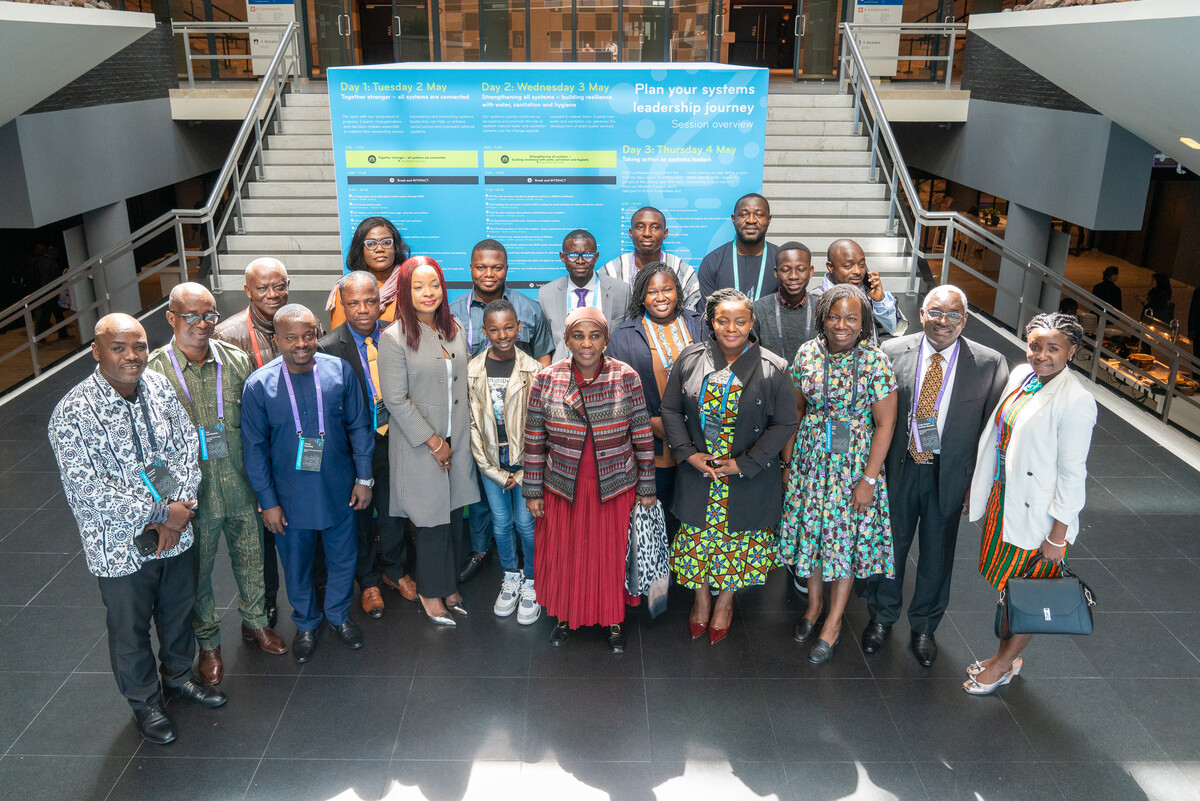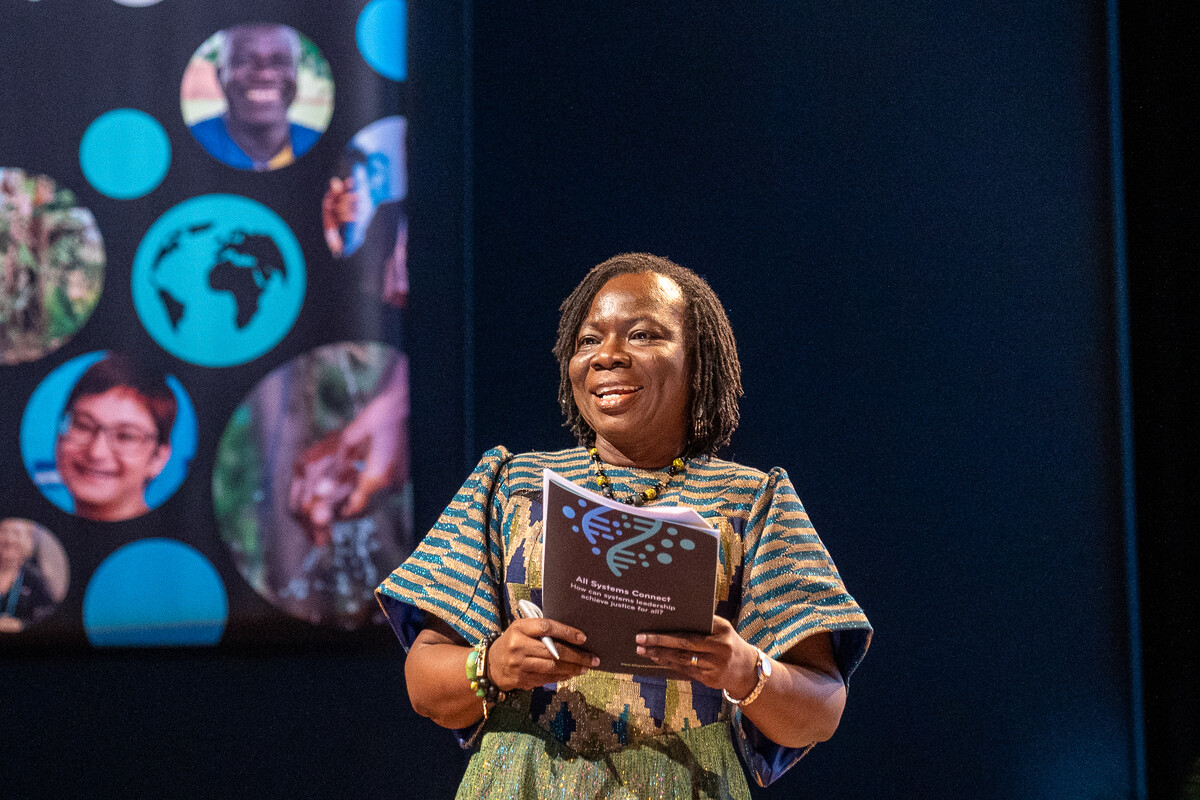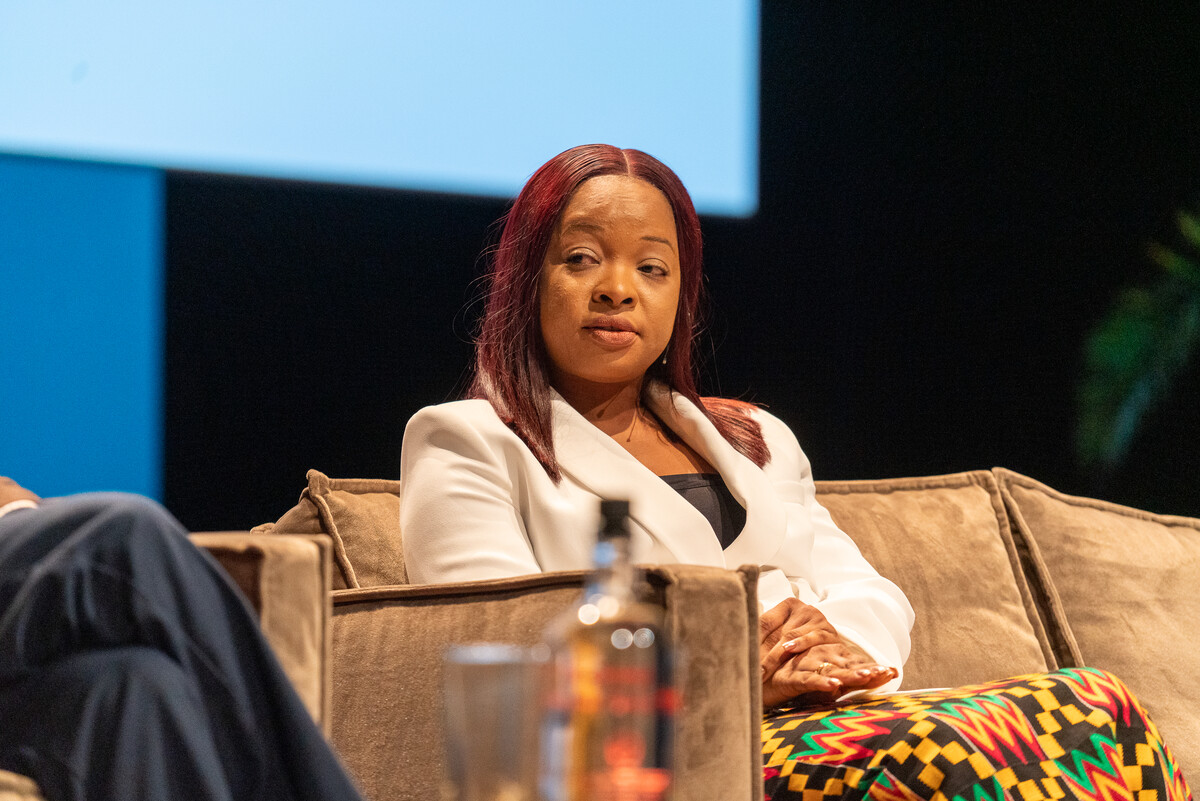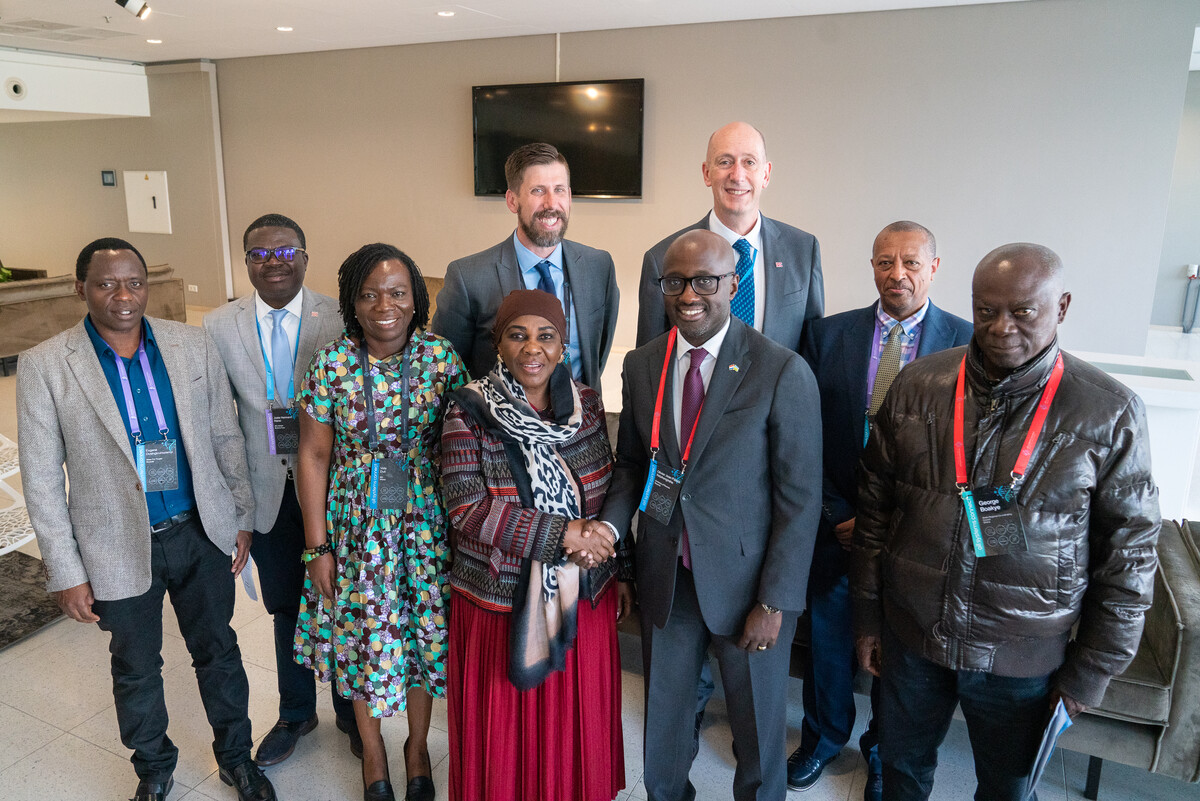Participation of Ghana Ministerial Delegation
Published on: 27/07/2023
Over 700 change makers and systems leaders from water, sanitation and hygiene, health, climate, economic development, and social justice gathered at the World Forum, The Hague, for the All Systems Connect International Symposium 2023. High level participants included 10 ministerial level delegations from Ethiopia, Guatemala, Ghana, Honduras, Indonesia, Liberia, Malawi, Nepal, Rwanda and Uganda. The purpose of the symposium was to prompt systemic thinking, leadership, and action across sectors and silos to achieve the Sustainable Development Goals by 2030.
The Symposium was convened by IRC, global nonprofit Water For People and Water for Good, - members of the One For All global alliance and delivered with multiple stakeholders including UNICEF, the Conrad N. Hilton Foundation, the World Health Organization, Sanitation and Water for All, the Government of the Netherlands, World Vision and the Osprey Foundation. The event followed the UN Water conference in March 2023.
The three core themes were systems leadership – leading across boundaries and driving collective action in complex circumstances; connecting across silos and sectors - finding better ways to address shared system challenges, together; and importantly on day three, acting for change– making commitments that will accelerate progress and deepen impact to achieve the Sustainable Development Goals (SDGs).
The event assembled 700 delegates and 250 presenters recognised for their global expertise and influence. They participated in 66 cross-cutting sessions on water, sanitation and hygiene, climate, finance, health and beyond exploring ten themes crafted to build connection, break silos and generate action. In addition, three Make Change design sprints ran to innovate and prototype solutions along with country dialogues involving high-level ministerial delegations designed to catalyze change.
This is a brief report that highlights Ghana's participation in the All Systems Connect International Symposium 2023. It includes a summary of the team's involvement in the overall altogether plenaries, session-specific and some side events and meetings.

Ghana Delegation at All Systems Connect 2023. Image Credits: Rockin Pictures
The high level delegation from Ghana was led by Cecilia Abena Dapaah, Former Minister for Sanitation and Water Resources and included senior government officials. The delegation was drawn from the sector Ministry, National Development Planning Commission, Ghana Health Service, Ahafo Regional Coordinating Council, Asunafo North Municipal assembly, Tano North Municipal Assembly, Asutifi North District Assembly and Asunafo South District Assembly.
The opening event, facilitated by the celebrated presenter, Ikenna Azuke and Vida Duti of IRC Ghana, started with an overview of the 3-day programme, welcome remarks by the convening partners - the One For All global alliance, represented by Samson Bekele, Co-CEO, Water For People and Jon Allen, CEO, Water for Good:
"We have a decade or less to accomplish a critical objective: ensuring that every home is equipped with taps and toilets and that every community enjoys access to safe, reliable, and continuous water, sanitation, and hygiene services. While we acknowledge our shortcomings in various areas, we possess a clear understanding of what is required to succeed. This includes forging collaborative commitments, securing increased funding for the sector, and fostering unwavering political will at all levels. The All Systems Connect initiative serves as a unifying platform where we can unite, arming ourselves with the necessary skills, knowledge, and connections to achieve remarkable progress within this limited timeframe."

Vida Duti, IRC Ghana Country Director at the All Systems Connect Opeing Plenary. Image Credits: Rockin Pictures
First theme address
Speakers on the opening day included: Dr Githinji Gitahi, Group CEO, AMREF Health Africa; Dr Mary E Ashinyo, Quality Lead and Deputy Director, Institutional Care Directorate, Ghana Health Service; Henk Ovink, Special Envoy for International Water Affairs, Dr. Kojo Mensah-Abrampa, Director General of the National Development Planning Commission (NDPC) and many other prominent figures who are leading change globally and locally. There were panel discussions proceeded by theme presentations – the first was by the Group CEO, AMREF Health Africa. His presentation addressed systems challenges and promoting the role of water, sanitation, and hygiene to support the health and wellbeing of all, noting that despite having shared goals, WASH and global health activities operate largely independent of one another, with separate strategies, policies, budgets.
A statement by the Sanitation and Water for All (SWA) partnership, delivered by Muyatwa Sitali, Public Policy, Government Engagement and Partnerships Specialist highlighted the relevance of All systems connect as a bold decision to push all toward embracing greater integration and collaboration and building strong systems. He stated that system leadership is vital in finding our way to success and addressing disparities and inequalities worldwide; and that achieving SDGs cannot be in isolation, hence the need to include decision makers beyond the sector - issues of health, climate, finance, etc. Mr. Sitali stated that All System Go was the first on this challenge and that we are here on All Systems Connect and the next destination must be All Systems Perform – that there is no performance without accountability, referencing to the theme of the UN Water Conference in March 2023. "Who will be accountable, who is ready not only to put the promises into the global or national discourse but implement, demonstrate progress? This conference is an opportunity for us to get practical," He added.
The first panel discussion on bridging the WASH-Health gap and promoting shared solutions that contribute to better health outcomes featured Dr Mary Ashinyo, Quality Lead and Deputy Director, Institutional Care Directorate of the Ghana Health Service (GHS). Responding to the question of the extent to which GHS adopts systems thinking and the challenges thereof, Dr. Ashinyo explained that universal access to health coverage goes beyond financial consideration, as access alone does not guarantee positive outcomes. "The emphasis is now on delivering high-quality care, which necessitates the integration of WASH into the healthcare system." She highlighted the importance of the Health Information System in collecting relevant data on WASH interventions, which helps identify areas that require enhanced WASH measures. On the challenges, the Deputy Director cited harmonisation, and coordination among development partners, which she indicated is being resolved through the adoption of health systems thinking approach, which includes all building blocks.
The second panel discussion featured Dr. Kojo Mensah-Abrampa, Director General of the NDPC and facilitated by Muyatwa Sitali of SWA. Responding to the question of what role water and sanitation play as a catalyst for development at large and what the challenge is in connecting WASH to other sectors, Dr. Mensah-Abrampah highlighted the priority placed on WASH by the Government of Ghana, and his role in ensuring that the development needs of the people are accurately represented. He admitted WASH consistently emerges as a priority when interacting with communities, but when asked about the topmost priority, they opt for jobs. He noted that there is changing dynamics of interrelationships within communities, where discussions on WASH are now interweaved with health and education, reflecting the evolving systems approach.

Dr Mary Ashinyo of Ghana Health Service participates in the panel discussion. Image Credits: Rockin Pictures
The Former Minister for Sanitation and Water Resources, Hon. Cecilia Abena Dapaah delivered the keynote address on 'Building resilience with water, sanitation and hygiene' at the day two altogether plenary. She recalled the hosting of the first All Systems Go Africa and the centrality of WASH in achieving the SDGs. Hon. Abena Dapaah indicated that to achieve universal access to WASH services by 2030 the current rates of progress need to increase significantly, which requires a clear and deliberate shift from business as usual. She stated that building resilient economies require a systems approach that connects various sectors, including WASH, health, agriculture, and urban development.
Former Minister reaffirmed Government of Ghana commitment to develop a Presidential Compact for WASH. This was announced at the March 2023 UN Water Conference where the importance of taking action and accelerating progress in water delivery services was emphasized. "The Government of Ghana intends to develop a Presidential Compact for WASH and enact legislation to establish a National Sanitation Authority and transform the Community Water and Sanitation Agency," she stated.
Former Minister also stated that Ghana aims to enhance private sector participation, increase financing, and create strong and resilient national systems for safe and sustainable WASH services. According to her, strengthening water resource management and collaborating with other sectors like health, agriculture, and energy are crucial for achieving universal access to water and sanitation. She called for collaboration across traditional boundaries and the involvement of development partners, financiers, and technical experts.
Watch the full keynote address
The Ghana Child Sanitation Diplomat, Maame Akua Ohenewaa Gyima made a big statement sharing her story and 'calling on systems leaders and practitioners to consider the potential of youth participation in the development agenda. Adding that children's concerns are an integral part of water and sanitation systems and solutions. Maame is a pupil in Basic 8, highly intelligent academically and passionate for improved sanitation and hygiene. She first entered the child-centered sanitation challenge in 2020 when she was nine years old and made it to the final. In spite of her inability to win the ultimate title in this first attempt, she established the O&B Foundation, through which she raises funds to organize WASH sensitization programmes.

Ghana Child Sanitation Diplomat, Maame Akua Ohenewaa Gyima. Image Credits: Rockin Pictures
Watch the full video of her speech
Former Minister Cecilia Abena Dapaah joined her colleagues from Malawi; Ethiopia; Guatemala; Honduras; Nepal, Liberia, Uganda, Cote D'Ivoire, Niger and Mali to affirmed their governments commitment to explore, promote and deliver presidential compacts to drive higher level government wide action on water and sanitation.
The ministers on behalf of Governments called on the development partner community to support the compacts, and help in strategies, tools and skills to deliver them and required systems strengthening. Sanitation and Water For All reaffirmed their commitment to collaborate with the One for All Alliance and the Government of the Netherlands to support Ghana and the other countries that have committed to Presidential Compacts.
At the country dialogue session on 'Leveraging Local Government Leadership for Scale' team Ghana, led by the Ahafo Regional Minister; the Municipal and District Chief Executives of Asunafo North Municipal Assembly, Tano North Municipal Assembly, Asunafo South District Assembly, and Asutifi North District Assembly; and NDPC discussed and highlighted the role of local government in driving the design and implementation of the Districtwide approach for universal WASH coverage. The team also showcased the role of the Regional Coordinating Council and NDPC in facilitating the replication of the system thinking initiative.
This was a great opportunity to learn from local and national government political and technical WASH systems leaders from Burkina Faso, Ghana, Honduras and Uganda.
All Systems Go Africa (ASGA), first organised in 2022 by the Government of Ghana, IRC and UNICEF is a symposium to enhance ownership and commitment to the Africa Water Vision 2025. One key outcome of that event was the joint announcement with AMCOW about institutionalising ASGA symposia, to be organised in different countries on a rotational basis. Rwandan Government was to host the next edition in 2025.
A brief handing over ceremony was held where Honourable Cecilia Abena Dapaah, Minister for Sanitation and Water Resources of the Republic of Ghana handed over the hosting responsibility of ASGA 2025 to Olivier Jean Patrick Nduhungirehe, Ambassador of Rwanda to the Kingdom of The Netherlands. The Ambassador officially accepted the role of hosting the next ASGA Symposium on behalf of the Government of Rwanda.
6.0 Side Events and Bilateral meetings

Handover event between the Ghana and Rwanda Governments. Image Credits: Rockin Pictures
The Ghana team led by the Hon. Minister had a number of side and bilateral meetings including,
Meeting with Conrad N. Hilton Foundation:
The Hilton Foundation through IRC and other grantee partners has been supporting District-wide initiatives for universal access to safe water, sanitation, and hygiene services in Ghana and the Ahafo region in particular. The Minister commended the foundation for the continued support. She also applauded the Asutifi North District Chief Executive, Hon. Anthony Mensah for his leadership role in developing and implementing the Asutifi North WASH master plan; and encouraged the replication of that system thinking initiative nationwide to accelerate progress of access to WASH services. Hilton Foundation assured the Minister of their commitment to the initiative and to continue working with existing grantees and upcoming ones.
Meeting with Sanitation and Water for All (SWA)
SWA developed a sustainability compact, which outlines actions to be taken at the ministerial level to ensure delivery of water and sanitation services, and Ghana is a signatory. The main discussion points were as follows:
Meeting with Safisana Ghana Limited
Safisana, a pioneering organization in waste management, has developed an integrated, circular system to address sanitation challenges and promote sustainable practices. They collect human and organic waste, converting it into energy and fertilizer, thereby creating social, economic, and environmental impact. Notably, Safisana opened West Africa's first waste-to-energy plant in Ashaiman, Ghana, in 2017, which operates as a locally managed company. A key focus for Safisana is the conversion of waste into electricity, contributing to the national grid. With expanding opportunities in Ghana, their mission for the next decade is to rapidly scale their operations and make a lasting impact on millions of people. Safisana wants to fundamentally improve the health and wellbeing of people living in appalling circumstances in non-sewered urban areas. The minister commended Safisana for their ground breaking venture and innovative work.
Finally, the Hon. Minister granted interview with the ASC studio team. She shared her thoughts on the key topics of the Symposium, notably the importance of systems leadership, the need to connect beyond sectoral boundaries and the importance of forming new allies to achieve the SDGs, citing Ghana specific cases including the presidential compact.
Over 90 district, national and regional leaders from ten country ministries including Ghana participated in the country dialogues to share their experiences on WASH development agendas and solutions. The key challenges identified in the country dialogues were 1) Lack of learning from improved WASH systems 2) WASH is underfunded and is not in the first five priorities of Governments' development programmes, and 3) lack of PPP frameworks to pool resources together for delivering WASH services, as we still approach the sector from a charitable angle. Key actions noted included but not limited to the following:
These together with other themes were co-developed with participants and will generate specific publications and detailed action agendas in the coming months.